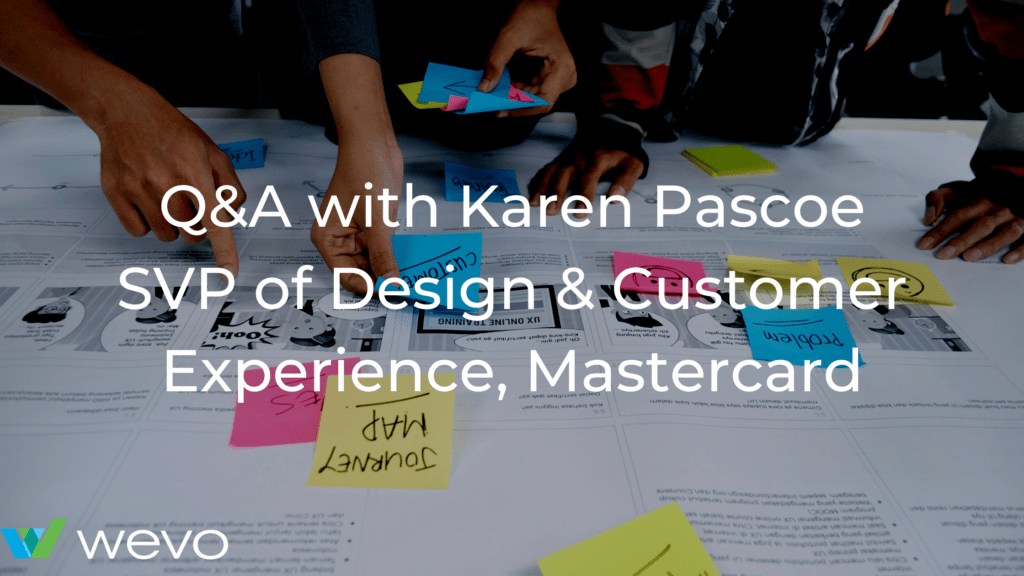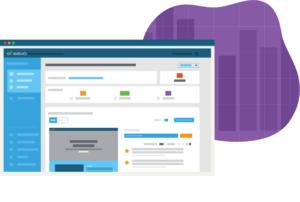Contents
- 1 Why are you excited to be in the UX research space at this time?
- 2 How have expectations from user experience research teams changed at MasterCard over the past few years?
- 3 What is the importance of speed in user research and what does performing user research at a rapid rate afford you as a business?
- 4 Why is it so important to reduce risk before launch? What are some of the benefits you’re seeing by being able to launch with more confidence?
- 5 What benefits have you seen at MasterCard by democratizing user research?
- 6 Watch the full conversation with Karen Pascoe, Senior Vice President of Customer Experience and Design at MasterCard in our webinar: How Human-Augmented AI Enables Effortless User Research.
Why are you excited to be in the UX research space at this time?
I’ve always been excited for the same reason, because people are fascinating. Understanding and uncovering what their needs really are is the thing that allows us to design a really great solution around it. In the earliest years of my career, I would do my own primary research and I just loved being able to talk to customers, engage with them, and understand what was really on their mind, not for what they wanted, but understanding what they needed.
It’s a continuous opportunity to learn, and I think there’s so many different dimensions we can really connect with and understand as the technology and the platforms are really evolving to have us just even more focused on customer behavior.
How have expectations from user experience research teams changed at MasterCard over the past few years?
Having been with the organization for seven years, one of the first things I needed to do is focus on was usability. We built out a lab in New York City that allowed us to do consumer research co-located with our developers and product teams. The proximity to our headquarters an hour north of the city allowed for curated executive participation. It’s really important because you’re bringing people together physically. It’s always a great part of the process when you can do that. It builds up a lot of trust and when you’re bringing in new ways of working, it’s incredibly important.
As we’ve evolved, we’ve worked more with research platform capabilities to be able to ask and answer smaller questions and to be able to move faster in a lot of different ways. Driving down uncertainty and driving up delight in terms of what we’re supporting. We’re also focusing on generative research and ethnography to understanding motivations and needs. We’re having an increasing amount of tools and capabilities that will equip the teams to answer these challenging problems and make sure we’re always continuing to meet customer needs.
What is the importance of speed in user research and what does performing user research at a rapid rate afford you as a business?
The payments business is going through massive change. The rise of digital has created an unprecedented amount of change that’s happened in a far faster period than we had expected before. So this really affects the pace with which business needs to move.
One of the roles Experience Teams really play is to be the catalyst and cultivator of empathy. If your broader product team, your technologists, your product managers, and your specialists are involved, the people going out and selling what you’re doing in addition to the crafts people, it really brings the solutions to life.
Having everybody be able to answer questions in real time, while you’re in a sprint cadence, not needing to stop the presses, around the work is really critical in being able to actually deliver research insights in real time. Not only is it driving the level of empathy for your product teams sky high, but you’re also having the teams trust the process, trust the research, and it becomes a real virtuous cycle.
Why is it so important to reduce risk before launch? What are some of the benefits you’re seeing by being able to launch with more confidence?
If I think about Mastercard’s business, I work for our chief innovation officer, and his mandate is to improve the volume of ideas and the quality of ideas. When I think from an innovation standpoint, we always think that we need to find the right problem and then get the right solution. I think our folks have been a little bit more hard-wired on the solution. If you don’t actually get to the right problem, you’re not really going to differentiate.
Understanding emotion is the leading edge of experience. Understanding the emotion of the sentiment is really critical to making sure that we are getting to the right need and the right painpoint. Allowing us to do this is critical across the board, beyond that it’s really the journey of taking the organization along with us. It’s getting the executives bought in around it. At MasterCard we could be 5, 7, 10 years into how we’re scaling through our value chain, through the over 200 countries that we’re really operating in.
It’s critical to reduce risk at every turn and that starts with the user and being research-driven through all of that.
What benefits have you seen at MasterCard by democratizing user research?
Designers love it. Designers are really the epicenter of empathy within the project team, and just to be able to have that cultivated, use it, ask and answer questions regularly is really awesome. The other part is just being pragmatic. We only have a certain number of researchers. What we’re doing is having our specialist researchers doing more of the generative, more sophisticated methods upfront, and then we’re going more and more to the designers, all the way through to really take that and run with it. But it’s not necessarily so segmented either.
We had an initiative where a lot of the research was done by specialists. But now we’ve been all the way in the other direction where the design team has been asking and answering questions and doing it with some frequency. You have to disrupt yourself a little bit. There are times where you really need to work together at different stages in the process and get the real specialist mindset and outside perspective, making sure that you’ve got the right methodological rigor around what you’re trying to do. Having that flexibility and fluidity across the teams to be able to pick the method is what’s going to get you to the right outcome.



